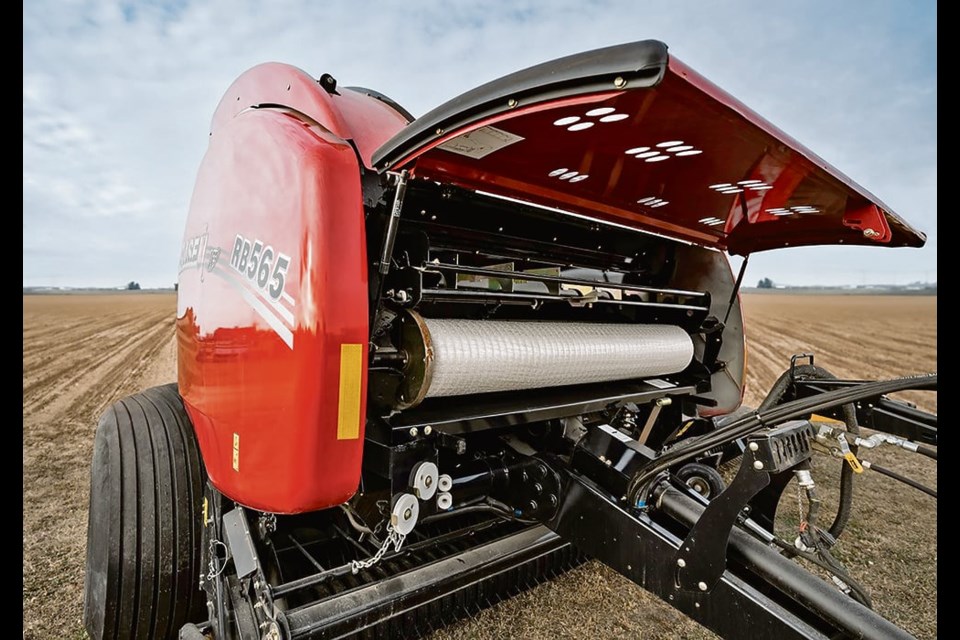WESTERN PRODUCER — Virtually every cattle farmer and rancher has tripped over an old piece of plastic baler twine or net wrap stuck in the ground in a corral or bale yard. The stuff just never seems to go away.
However, an entrepreneurial Alberta ranching family has come up with a solution to eliminate that problem with a new compostable net wrap product.
Their new company, Nature’s Net Wrap, has partnered with CNH Ventures, the investment arm of CNH (the parent company of New Holland and Case IH), to bring the product to market and eventually retail it through CNH brand dealers. It is expected to be commercially available in time for the 2024 growing season.
“The first idea came for it in 2015, while my dad and I were out cutting net wrap and twine off our bales,” said Austin Ruud, co-founder of Nature’s Net Wrap.
“We go through a few thousand bales a year, so you can imagine how much plastic is in our bale yard from net wrap. There’s not an end-of-life solution for it (plastic) right now”
The Ruuds tested various materials to find a suitable alternative to plastic wrap over the course of several years.
“Like a lot of inventions, it’s out of a combination of frustration and necessity,” said Austin’s father, Larry.
“Austin came up with this idea when we were trying to figure out a sustainable solution that deals with all this plastic. It’s plant based, there are no petrochemical components to this at all. It’s 100 percent based on renewable resources.
“Launching this, we will be the first ones, globally, to bring a product to market that is truly compostable and naturally breaks down in the soil.”
Field trials of the product show the Nature’s Net Wrap product will last at least a full 12 months tied around a bale in storage, still keeping enough strength to hold the bale together as it is moved around.
However, even plastic wrap tends to degrade during long-term storage.
“If plastic is in contact with the ground, there’s a breakdown where it’s going back into its original micro-plastic or pelleted form,” said Austin.
“But it doesn’t get consumed by the soil; whereas our material with an end life gets consumed by the soil.
“It’s made out of biopolymers that are made from renewable resources. Getting away from the petrochemical source was very important to us.
“From our testing, at least here in Alberta, we know that on the bales we have, our net wrap has lasted over 12 months and has not been significantly impacted by UV or water degradation. The key is being in contact with the soil and being consumed by soil micro-organisms and enzymes.”
To maximize its storage life, the Ruuds recommend what they call mushroom stacking, placing the bottom bale on end and putting another bale horizontally on top. During evaluations, they took samples of their net wrap every four months from bales in storage to determine its condition and see if it was holding up. Even the bales with the net wrap on the bottom in contact with the ground held up fine for 12 months.
“We could tell from our testing that the bale wrap in contact with the ground did degrade faster than the net wrap not in contact, but it wasn’t serious enough for it to fall apart,” Austin said.
Working with CNH, the Ruuds are continuing to evaluate how the product holds up in various climates across North America in order to provide farmers with recommendations for best storage practices, which will further maximize its storage life.
“We’ve been working with CNH in different geographies all the way from central Florida to our country, here,” said Larry.
“We’ll continue to do that to come up with storage recommendations for different geographies, based on different soil types and climate zones. We’ll see what those recommendations are as we continue to test this outside of our area.
“It’s more around best practices, we know the technology works. We know we can handle it, store it, pick those bales up and move them again to feed them, just like people do with plastic today.”
The Nature’s Net Wrap product doesn’t compromise on strength either, according to Austin.
“Ours actually has a higher tensile strength than plastic net wrap does,” he said.
“The predominant net wrap on the market is classed as soft net wrap. Ours is more comparable to an oriented or hard net wrap, which is a stronger material.”
There are no differences when using it during the baling season. It loads and runs through the baler just as easily as plastic wrap, and it is also no different than plastic wrap when it comes to storing unused rolls of net wrap left over at the end of the year.
It will be available in 48-, 51-, 64- and 67-inch widths, but pricing hasn’t been set yet.
“We’re working through that right now,” said Larry.
“We obviously are sensitive to keep this as close to plastic pricing as possible.”
Nature’s Net Wrap expects to launch a website at sometime in February.




